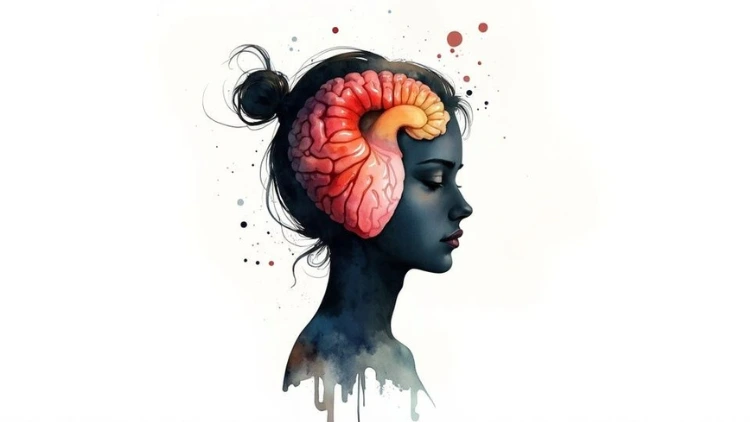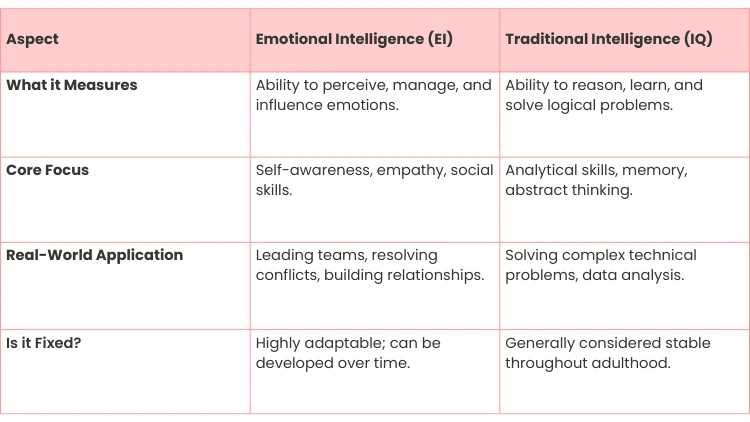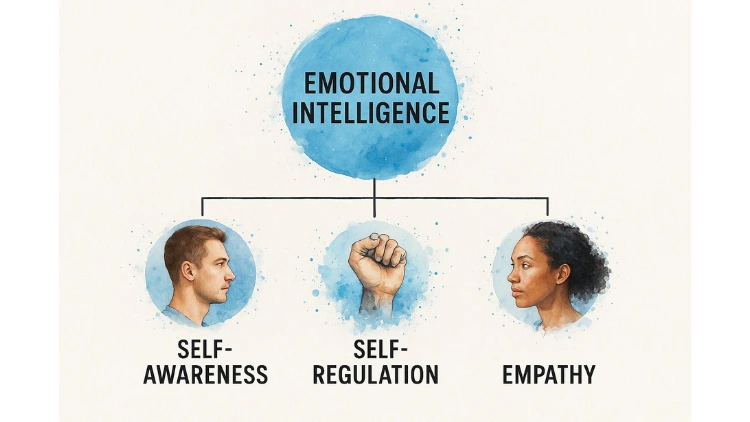What is Emotional Intelligence and Why It Matters

Emotional intelligence is your ability to spot, understand, and handle your own emotions. But it doesn't stop there—it's also about sensing, influencing, and getting a read on the emotions of the people around you. Think of it less like some vague "soft skill" and more like a practical toolkit for navigating the human world.
Jump To Section

Earn As You Learn
Earn 25% commission when your network purchase Uplyrn courses or subscribe to our annual membership. It’s the best thing ever. Next to learning,
of course.
Understanding Emotional Intelligence Beyond The Hype
Ever wondered why some of the most technically brilliant people you know just can't seem to click in a team? Or how others with seemingly average skills climb the ladder with ease? The secret ingredient is often emotional intelligence, or EI.
It's the knack for being an "emotional architect"—someone who can see the underlying emotional blueprints in a situation and use them to build stronger connections, solve problems, and get better results.
This isn't just a nice-to-have. EI is a powerful predictor of success, both in your career and your personal life. A leader with high EI doesn't just bark orders. They can sense their team's morale is dipping before a big deadline and step in to motivate them, heading off burnout before it starts. That ability to read the room is EI in action.

Emotional Intelligence (EI) vs. Traditional Intelligence (IQ)
So, how does EI stack up against the more familiar concept of IQ? While both are types of intelligence, they measure completely different things. IQ is about your cognitive abilities—your "book smarts"—while EI is all about your "people smarts."
Here's a quick breakdown. Ultimately, IQ might get you in the door, but it's your EI that will determine how well you work with others and how far you'll go once you're inside.

Why EI is Not Just 'Being Nice'
One of the biggest myths about emotional intelligence is that it's just about being friendly or polite. While kindness is certainly part of the equation, true EI is a much deeper and more complex set of skills.
It's about perception and active management, not just passive pleasantries.
- Perceiving Emotions: This is your ability to accurately spot feelings—in yourself and in others. A lot of this comes down to picking up on non-verbal cues. For example, noticing a colleague’s slumped shoulders and quiet tone after a meeting might tell you they’re disappointed, even if they say “I’m fine.”
- Understanding Emotions: Once you spot an emotion, the next step is figuring out what it means. This involves understanding the cause and effect of feelings. For instance, realizing your own procrastination on a task isn't laziness, but anxiety about failing. If you want to dive deeper, you can explore this guide on what exactly are emotions.
- Managing Emotions: This is where the rubber meets the road. It’s the skill of keeping your own emotional reactions in check and guiding others to do the same. A practical example is choosing to take a 10-minute walk to cool down after receiving frustrating feedback, instead of sending an angry email.
The Four Core Abilities of Emotional Intelligence
Emotional intelligence isn't some fuzzy, abstract concept. It's a real-world skillset made up of four distinct abilities that you can actually practice and get better at over time. Think of it as a roadmap: it starts with understanding yourself and builds outward to managing your interactions with others.
While EQ is its own unique strength, it works hand-in-hand with other cognitive skills. If you're curious about the different ways our brains are wired, you can explore the 9 types of intelligence and how they learn.
The graphic below breaks down the core pillars perfectly.
You can see how everything starts with Self-Awareness, which then allows for more complex skills like Self-Management and Empathy to develop.
1. Self-Awareness
Everything starts here. Self-awareness is the bedrock of emotional intelligence. It’s your ability to see your own emotions clearly as they pop up and understand how they’re affecting your thoughts and actions. This isn't about judging your feelings as good or bad—just recognizing them for what they are.
Actionable Insight: The next time a strong feeling hits you, just pause for a second and put a name to it. Simply thinking, "Okay, I'm feeling anxious because of this deadline," is an act of self-awareness. It grounds you in reality and is the first step toward managing that feeling.
This skill is surprisingly rare. A study found that while 95% of people think they're self-aware, only about 10% to 15% actually are. That's a huge gap. Globally, some estimates suggest only 36% of people are considered emotionally intelligent, which really shows how much we can all improve.
2. Self-Management
Once you know what you’re feeling, the next step is deciding what to do about it. That's self-management. It’s your ability to keep impulsive feelings in check, adapt to changing situations, and guide your behavior in a productive way.
Practical Example: You get an email with some tough feedback and your first instinct is to feel defensive. Instead of firing back a knee-jerk reply, self-management helps you step away for an hour, cool off, and then write a calm, professional response that focuses on solutions.
This is the skill that stops a moment of frustration from ruining a meeting or a flash of fear from holding you back.
3. Social Awareness
After you've got a handle on your own internal world, you can start looking outward. Social awareness is about tuning into other people. It’s the ability to pick up on their emotions, understand where they’re coming from, and sense the overall vibe of a room.
Empathy is the key ingredient. It’s not about feeling sorry for someone; it’s about genuinely trying to understand their perspective, even when you don't agree with it.
Practical Example: In a team meeting, you notice a coworker is quiet, arms crossed, avoiding eye contact. Your social awareness kicks in, and you guess they might be feeling unheard. So, you bring them into the conversation: "Sarah, you have a lot of experience here. What are your thoughts on this?"
4. Relationship Management
This is where it all comes together. Relationship management is using your awareness of your own emotions and others' emotions to navigate social situations successfully.
It's about communicating clearly, inspiring people, handling conflict constructively, and building solid, trusting connections. For instance, a leader skilled in relationship management doesn't just point out a team's mistake. They frame it as a learning opportunity, provide clear guidance for improvement, and express confidence in the team's ability to succeed next time. They build bridges, not walls.

How Emotional Intelligence Drives Real-World Success
Knowing the theory behind emotional intelligence is a great start, but the real magic happens when you see it in action. High EI isn't just about being "nice"—it's a powerful toolkit for making smarter decisions under pressure, navigating complex social dynamics, and building the kind of trust that truly accelerates your life and career.
The numbers back this up in a big way. Consider this: emotional intelligence is responsible for roughly 58% of performance in all types of jobs. It gets even more compelling when you look at the top of the ladder, where a staggering 90% of high-performers also have high EI.
This isn't just about job satisfaction, either. It translates directly to your bank account. On average, people with higher emotional intelligence earn $29,000 more each year than their counterparts.
From the Office to Your Personal Life
The incredible thing is that these benefits don't just stop when you clock out for the day. The same skills that help you defuse a tense meeting or inspire your team are the exact ones that strengthen your relationships with friends and family. A huge part of success in any area of life comes down to managing your own well-being, and understanding the link between mental health and student retention really highlights this connection.
When you can accurately pick up on a friend's subtle signs of distress or manage your own frustration in a tough conversation, you're building more resilient and meaningful connections. This creates a stronger support system, naturally lowers stress, and leads to a much deeper sense of fulfillment.
Actionable Insight: Next time you're in a disagreement with a friend or family member, consciously try to identify the underlying emotion behind their words. Are they angry, or are they hurt? Responding to the deeper emotion rather than the surface-level anger can completely change the dynamic of the conversation.
Think of it like this: a project manager with high EI senses friction building within her team. She steps in to mediate before it explodes and jeopardizes a deadline. That same evening, she uses the exact same skill to navigate a disagreement with her partner constructively, turning a potential fight into a moment of connection.
It's the same core ability, just applied in different settings—and it gets positive results every single time.

Applying EI in Leadership and Team Dynamics
In any organization, emotional intelligence is the invisible current guiding teams toward success or steering them toward failure. This is especially true in leadership, where one person’s EI can set the entire tone for the workplace.
A leader with high EI motivates through empathy and genuine understanding, not just top-down authority. They inspire real loyalty because their people feel seen, heard, and supported. This isn’t just a nice idea; research shows that 90% of a senior leader's success can be chalked up to their emotional intelligence. It makes EI twice as important as IQ for effective management. If you want to dive deeper, you can read the full research about leadership effectiveness and see the data for yourself.
This kind of leadership creates a powerful, positive ripple effect across the entire team.
Fostering High-Performing Teams
When a leader consistently demonstrates emotional intelligence, it nurtures a culture where people feel safe. Safe enough to pitch new ideas, voice concerns, or even admit to a mistake without fearing blame. This environment is what experts call psychological safety, and it’s the absolute bedrock of innovation and collaboration.
Think about a manager with sharp social awareness who notices a team member is showing early signs of burnout. Instead of just cracking the whip to meet a deadline, they pull that person aside for a real conversation. They dig into the root cause—maybe it’s an impossible workload or a lack of resources—and then work with them on a solution. You can learn more about the prominence of psychological safety in this guide.
Practical Scenarios of EI in Action
Seeing emotional intelligence applied in real life helps move it from an abstract concept to a practical tool. It's how you improve workplace dynamics and get better results, day in and day out.
- Constructive Conflict Resolution: A team lead uses their relationship management skills to mediate a disagreement between two colleagues. By helping each person truly hear the other's perspective ("John, what I hear you saying is... Mary, it sounds like your concern is..."), the lead turns a potential blow-up into a productive discussion. The outcome? A stronger working relationship.
- Boosting Morale and Resilience: Imagine a team is grinding through a tough project with a crazy deadline. A leader with high EI can sense the stress levels rising. They proactively call a quick huddle—not to add more pressure, but to acknowledge the hard work, celebrate a few small wins, and reinforce the "we're in this together" spirit. That simple act can rebuild collective resilience.
Teams with high collective emotional intelligence don't just work together; they thrive together. They have fewer conflicts, collaborate more seamlessly, and are far better equipped to navigate bumps in the road as a unified force.

Actionable Steps to Develop Your Emotional Intelligence
Alright, let's move from knowing what emotional intelligence is to actually doing something about it. Theory is great, but the real growth happens when you put these ideas into practice.
Building up your EI isn't a one-and-done task; it's more like strengthening a muscle. It takes consistent, small efforts over time. Think of it as a journey, not a destination. For younger folks looking to get a head start, structured programs like emotional intelligence coaching for teens can offer a great framework and the right kind of support to build these life-changing skills early on.
Enhance Your Self-Awareness
This all starts with simply paying attention to what's going on inside you, without judging yourself for it. One of the best ways to do this is with a quick bit of journaling. Seriously, just five minutes at the end of the day can make a huge difference.
Grab a notebook and jot down your thoughts using this simple prompt:
- What was the situation? A quick note on what happened. Example: "Received critical feedback from my manager."
- What emotion did I feel? Try to get specific. Was it frustration, excitement, or maybe disappointment? Example: "Felt defensive and a little embarrassed."
- What physical sensations did I notice? Did your shoulders tense up? Did your heart start racing? Example: "My face felt hot and my stomach was tight."
- What was my immediate impulse? What was your gut reaction? What did you want to say or do right away? Example: "Wanted to immediately list all the reasons the feedback was wrong."
Doing this consistently forges a powerful connection between your experiences and your emotional responses. It’s the bedrock for everything else that follows.
Practice Self-Management with a Tactical Pause
Once you can see your emotions, the next step is managing them. Self-management is all about hitting the brakes on those impulsive, knee-jerk reactions. The most effective tool for this? The tactical pause.
Picture this: you get a frustrating email, or you're about to give a big presentation and feel that wave of anxiety. Instead of letting the emotion take over, you consciously stop.
The goal of the tactical pause is to create a gap between an emotional trigger and your response. In that space, you regain control and can choose a more constructive action instead of letting your impulses take over.
Just take one slow, deep breath. That tiny action is enough to interrupt the emotional short-circuit in your brain, giving your rational mind a moment to catch up. If you want to really master this, you can dig deeper into how to pause to understand your reactions and build it into a solid habit.
Boost Social Awareness Through Active Listening
Ready to tune into others? The key to better social awareness is to shift your focus from formulating your reply to truly hearing what the other person is saying. Try practicing active listening in your next conversation.
Here's a simple exercise: When the other person finishes talking, try to paraphrase what you heard. Say something like, "So, if I'm getting this right, you're feeling frustrated because the project scope changed without any warning. Is that accurate?" This does two things: it confirms you're actually on the same page and, more importantly, it shows them you care enough to understand.
Improve Relationship Management with Better Feedback
Finally, building strong relationships hinges on clear, empathetic communication—especially when things get tough. Giving feedback is a classic example. Instead of a vague, accusatory statement like, "You're always late," which just puts people on the defensive, try the "Situation-Behavior-Impact" (SBI) model.
It breaks down like this:
- Situation: "At the team meeting this morning..."
- Behavior: "...you arrived ten minutes late."
- Impact: "...which meant we had to repeat the introduction, disrupting the flow for everyone."
This framework keeps the conversation focused on the action and its consequences, not on attacking the person. It's specific, objective, and a much better starting point for a productive chat.
Common Questions About Emotional Intelligence
To really nail down the concept of emotional intelligence, let's run through a few of the questions that pop up most often. Think of this as clearing up the last few fuzzy spots and making sure the core ideas are crystal clear.
Can Emotional Intelligence Be Learned?
Absolutely. It's a common myth that you're either born with it or you're not. The truth is, emotional intelligence is not a fixed trait.
Think of it just like a muscle. Some people might start out naturally stronger, but anyone can build up their EI skills—self-awareness, self-management, empathy, you name it—with consistent practice and a bit of focused effort.
For instance, just practicing that "tactical pause" we talked about earlier is a direct way to train your self-management muscle. What starts as a conscious choice eventually becomes a more automatic, healthier habit when you're under pressure.
The most encouraging fact about emotional intelligence is that it is learnable and can be developed at any stage of life. It’s never too late to start improving how you understand and manage emotions.
What Is the Difference Between EI and Empathy?
This one trips a lot of people up, but the distinction is pretty simple when you break it down.
Empathy is one crucial component of emotional intelligence, but it isn't the whole picture. Empathy is your ability to tune into what others are feeling—that’s the social awareness piece of the puzzle.
But true emotional intelligence goes further. It also involves managing your own feelings (self-management) and then using all that insight to build strong connections (relationship management). For example, a doctor might use empathy to understand a patient's fear, but they need self-management to remain calm and relationship management to communicate a complex diagnosis clearly and compassionately.
By the way, having strong EI is also fundamental to mastering interpersonal communication and why it matters.
Are There Ways to Measure My EI?
Yes, and you've got a few options depending on how deep you want to go. For a formal approach, there are assessments like the Emotional Quotient Inventory (EQ-i 2.0) or the Mayer-Salovey-Caruso Emotional Intelligence Test (MSCEIT). These are pretty comprehensive and often used in professional coaching or corporate development programs.
But for a more practical, real-world measurement, 360-degree feedback is incredibly powerful. This just means asking people you trust—colleagues, your manager, even close friends or family—for honest feedback on how you handle different emotional situations.
Actionable insight: You could ask a trusted colleague, "When we had that project deadline crisis last month, how did my communication come across to you? Was I calm or did I seem stressed?" This gives you direct insight into how your EI is perceived by others, which is often the most useful data you can get.
Ready to build your emotional intelligence and other critical career skills? At Uplyrn, we provide expert-led courses and a supportive community to help you achieve your professional goals. Start your learning journey with us today!


Leave your thoughts here...
All Comments
Reply